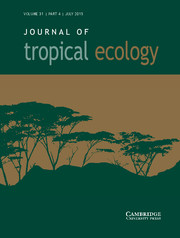Crossref Citations
This article has been cited by the following publications. This list is generated based on data provided by
Crossref.
Battles, John J.
Fahey, Timothy J.
and
Harney, Ellen M.B.
1995.
Spatial patterning in the canopy gap regime of a subalpine Abies‐Picea forest in the northeastern United States.
Journal of Vegetation Science,
Vol. 6,
Issue. 6,
p.
807.
Webb, Edward L.
1997.
Canopy removal and residual stand damage during controlled selective logging in lowland swamp forest of northeast Costa Rica.
Forest Ecology and Management,
Vol. 95,
Issue. 2,
p.
117.
Oliveira-Filho, Ary T.
Márcio de Mello, José
and
Scolforo, José Roberto S.
1997.
Effects of past disturbance and edges on tree community structure and dynamics within a fragment of tropical semideciduous forest in south-eastern Brazil over a five-year period (1987–1992).
Plant Ecology,
Vol. 131,
Issue. 1,
p.
45.
Arévalo, José Ramón
and
Fernández‐Palacios, José María
1998.
Treefall gap characteristics and regeneration in the laurel forest of Tenerife.
Journal of Vegetation Science,
Vol. 9,
Issue. 3,
p.
297.
Dalling, J.W.
and
Denslow, J.S.
1998.
Soil seed bank composition along a forest chronosequence in seasonally moist tropical forest, Panama.
Journal of Vegetation Science,
Vol. 9,
Issue. 5,
p.
669.
Nicotra, Adrienne B.
Chazdon, Robin L.
and
Iriarte, Silvia V. B.
1999.
SPATIAL HETEROGENEITY OF LIGHT AND WOODY SEEDLING REGENERATION IN TROPICAL WET FORESTS.
Ecology,
Vol. 80,
Issue. 6,
p.
1908.
Gale, Neil
2000.
The Relationship between Canopy Gaps and Topography in a Western Ecuadorian Rain Forest1.
BIOTROPICA,
Vol. 32,
Issue. 4,
p.
653.
Gale, Neil
2000.
The Relationship between Canopy Gaps and Topography in a Western Ecuadorian Rain Forest1.
Biotropica,
Vol. 32,
Issue. 4a,
p.
653.
Denslow, Julie S.
and
Guzman G., Sandra
2000.
Variation in stand structure, light and seedling abundance across a tropical moist forest chronosequence, Panama.
Journal of Vegetation Science,
Vol. 11,
Issue. 2,
p.
201.
Schnitzer, Stefan A.
Dalling, James W.
and
Carson, Walter P.
2000.
The impact of lianas on tree regeneration in tropical forest canopy gaps: evidence for an alternative pathway of gap‐phase regeneration.
Journal of Ecology,
Vol. 88,
Issue. 4,
p.
655.
Montgomery, Rebecca A.
and
Chazdon, Robin L.
2001.
FOREST STRUCTURE, CANOPY ARCHITECTURE, AND LIGHT TRANSMITTANCE IN TROPICAL WET FORESTS.
Ecology,
Vol. 82,
Issue. 10,
p.
2707.
Schnitzer, Stefan A.
and
Carson, Walter P.
2001.
TREEFALL GAPS AND THE MAINTENANCE OF SPECIES DIVERSITY IN A TROPICAL FOREST.
Ecology,
Vol. 82,
Issue. 4,
p.
913.
Wirth, Rainer
Weber, Bettina
and
Ryel, Ronald J
2001.
Spatial and temporal variability of canopy structure in a tropical moist forest.
Acta Oecologica,
Vol. 22,
Issue. 5-6,
p.
235.
Guariguata, Manuel R
and
Ostertag, Rebecca
2001.
Neotropical secondary forest succession: changes in structural and functional characteristics.
Forest Ecology and Management,
Vol. 148,
Issue. 1-3,
p.
185.
McCarthy, J
2001.
Gap dynamics of forest trees: A review with particular attention to boreal forests.
Environmental Reviews,
Vol. 9,
Issue. 1,
p.
1.
Venâncio Martins, Sebastião
and
Ribeiro Rodrigues, Ricardo
2002.
Gap-phase regeneration in a semideciduous mesophytic forest, south–eastern Brazil.
Plant Ecology,
Vol. 163,
Issue. 1,
p.
51.
Run-Guo, Zang
and
Bo-Sun, Wang
2002.
Study on canopy disturbance regime and mechanism of tree species diversity maintenance in the lower subtropical evergreen broad-leaved forest, South China.
Plant Biosystems - An International Journal Dealing with all Aspects of Plant Biology,
Vol. 136,
Issue. 2,
p.
241.
Chazdon, Robin L.
2003.
Tropical forest recovery: legacies of human impact and natural disturbances.
Perspectives in Plant Ecology, Evolution and Systematics,
Vol. 6,
Issue. 1-2,
p.
51.
Souza, Alexandre F.
and
Martins, Fernando R.
2005.
Spatial Variation and Dynamics of Flooding, Canopy Openness, and Structure in a Neotropical Swamp Forest.
Plant Ecology,
Vol. 180,
Issue. 2,
p.
161.
Makana, Jean‐Remy
and
Thomas, Sean C.
2005.
Effects of Light Gaps and Litter Removal on the Seedling Performance of Six African Timber Species1.
Biotropica,
Vol. 37,
Issue. 2,
p.
227.


